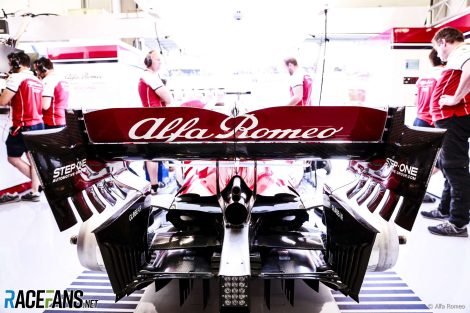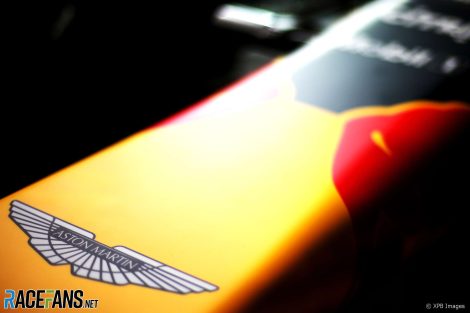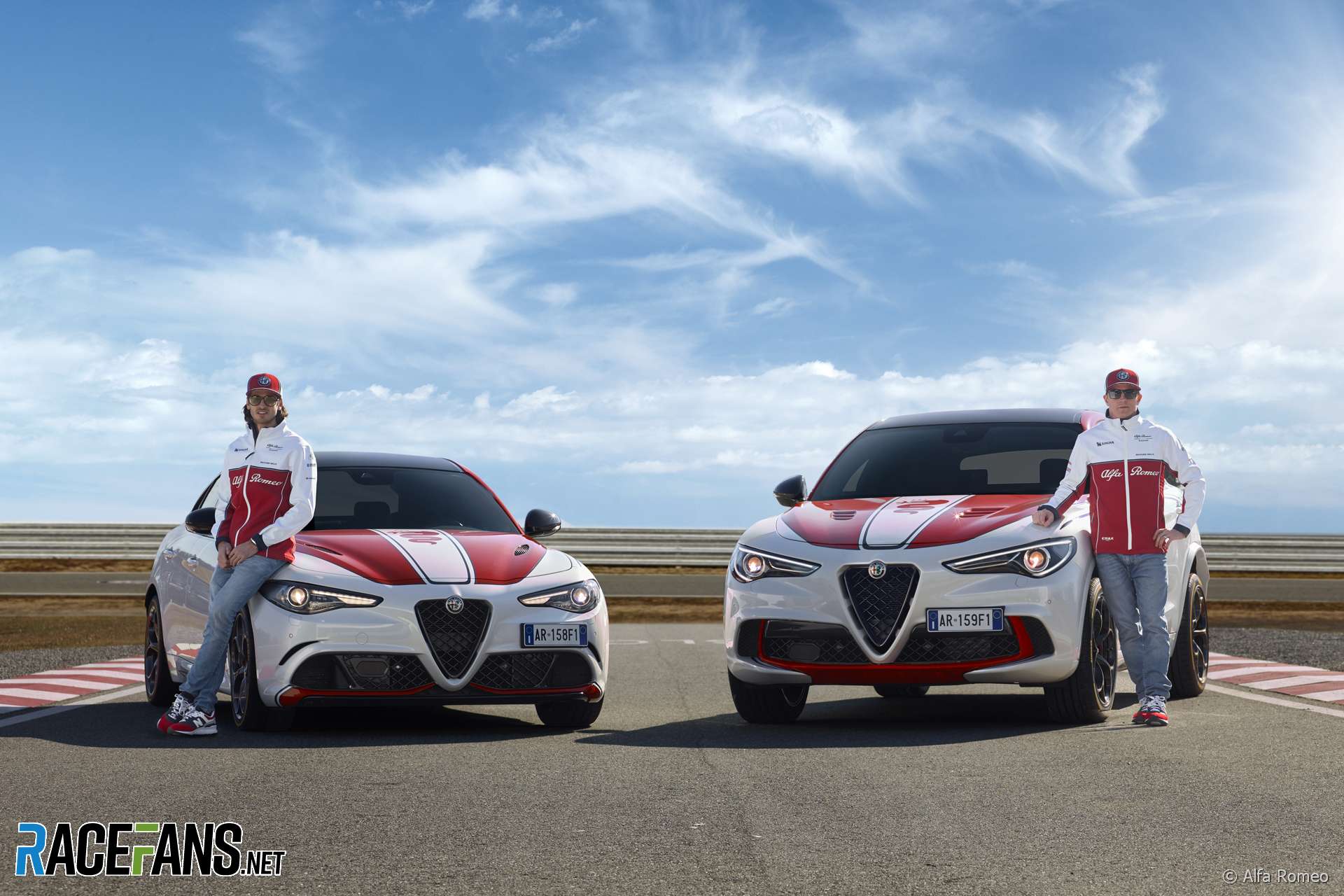There are eight automotive brands represented on the current Formula 1 grid. Two (Mercedes and Renault) are mainstream, two (Ferrari and McLaren) fill specialist niches but are fully committed, two (Alfa Romeo and Aston Martin) are using F1 as an image platform only without any technical involvement, one (Honda) is an engine supplier only, and the last (Infiniti) rides on the back of its Renault-Nissan alliance partner.
We could compare this statistic to the heyday of manufacturer involvement during the mid-noughties, when F1 boasted the same number, namely Ferrari, Renault, Toyota, Honda and Jaguar (Ford) as team owners; Mercedes and BMW as engine suppliers; and Fiat as Ferrari’s alliance partner.But this comparison would be rather disingenuous. Measured on an overall basis, manufacturer commitment a decade ago ran well beyond present levels. Back then five manufacturer teams also supplied engines to independent teams, while two provided engines only – so seven in total, ranging from Ferrari and Mercedes through BMW, Honda, Renault and Toyota to Cosworth, which was then owned by Ford.
Still, as several of their boards came to realise, F1’s economics made little sense, particularly as the global economic crisis bit and/or they failed to win. So their brands departed. By 2011 the grid featuring Ferrari in its usual role, Mercedes as team owner and engine supplier and Renault (engines), plus Cosworth (restored to private hands). When hybrid engines arrived Cosworth exited and Honda returned, restoring the status quo.
These comparisons, spread over less than two decades, prove how finicky manufacturer involvement can be. Boardroom-level decisions to enter are invariably the result of long-winded presentations and much dithering. On the other hand, exits usually occur rapidly as a result of knee-jerk reactions to some calamity.

Mercedes presents a fascinating case study for analysts. Its stock hit a peak of around $110 in March 2015 following the Silver Arrows’ first double title. Then it slid inexorably downwards, eventually bottoming at $50 last August, around the same time it became clear the team was on course to snare its sixth double title. It had rebounded slightly since.
Meanwhile Mercedes’ natural market competitors Audi and BMW – who prefer Formula E, endurance racing and touring cars to F1 – rose 25% and stayed static respectively during the same window. Chinese investors, though, clearly see value in the three-pointed star, for the largest shareholder is Geely Group, while Beijing Automotive recently acquired a 5% holding.
Mercedes announced record 2019 sales as this was written, but the fine print shows these were mainly in the luxo-barge and SUV sectors in three markets: Germany, USA and China. BMW Group out-sold its arch-enemy; Reuters reported the final score to be 2.52m versus 2.34m.
Advert | Become a RaceFans supporter and
Renault revived their full manufacturer team in 2016 and are gearing up to take advantage of F1’s regulations overhaul in 2021. But all is not well behind the scenes. The word is that former CEO Thierry Bollore was preparing the company’s exit from F1 before he was summarily dismissed in October. He is likely to be replaced by ex-Seat boss Luca de Meo, whose CV displays little evidence of F1 interest and who will have his hands full dealing with fall-out the arrest and subsequent escape of ex-CEO Carlos Ghosn, who championed the company’s F1 efforts.

Contrast that with the value of arch-rival Peugeot, which has been absent from top-level motorsport for almost 10 years, but will return in WEC’s new hypercar class next year. Its stock has risen 25 per cent in five years. During Ghosn’s post-escape press conference he said the auto sector “rose on average 12% during the past two years”, putting Peugeot owner PSA – currently in the midst of a merger with Fiat Chrysler Automobiles (FCA) – ahead of the curve.
Honda returned to F1 in early 2015 with McLaren at a time when its share price was ¥3500, rising to almost ¥4500 as the power unit’s problems became apparent, then regressing to ¥3100 as performance improved. It dipped to a low of ¥2500 within weeks of the brand scoring two grands prix victories via Red Bull Racing!
During the same period the market values of rivals Toyota and Nissan remained relatively strong until the Ghosn affair knocked the latter’s share price. Immediately after announcing a one-year extension to its F1 campaign, Honda stock dropped ¥200 from a six-month high.
Advert | Become a RaceFans supporter and

Alfa Romeo, which targeted annual sales of 400,000 units globally off a five-model platform when it inked its deal with Sauber, will be fortunate to move a tenth of that projection this year. Who would have thought that on a global basis the Serpent would be outsold by sister Lancia, whose sole model – the Lancia – is only sold in Italy?
Given that Alfa owner FCA will soon merge with PSA, one wonders whether the revised board will countenance a continuation of the F1 marketing programme, and the effect of any decision on the share price.
Aston Martin is title sponsor to Red Bull Racing in order to be ‘in the conversation’ when prospective punters talk supercars. But the partnership has not avoided a share price rout: having listed at $22 in October 2018, their value tumbled 80% to $5-ish. Worse, an imbalanced sales mix favouring lower-end product and decreasing overall margins have seen earnings revised downwards thrice in 12 months.

If all this seems rather negative, Ferrari and McLaren provide reasons to be cheerful. It’s true the former is far from immune against the vagaries of global economics: It listed on the New York Stock Exchange in 2015 and is required to post reasonable returns rather than blow its profits on F1. But Ferrari’s share price (RACE) has appreciated in leaps and bounds, having opened in 2019 at $105 and closed the year at $165
The NYSE is an insatiable monster that needs regular feeding, but Ferrari should be good for the foreseeable future providing it posts strong profits. The pending arrival of its ultra-luxury SUV, codenamed Purosangue, is expected to do wonders for those, however much its existence may pain Ferrari purists.
McLaren Automotive is on schedule to record 5,000-plus sales in 2020 and further boosts in profits. Its turnover reflects a well-nigh five-fold increase from $300m in 2012, the first full sales year, but beware – the division’s underlying profits would hardly keep the F1 team in Renault engines, so voracious are new (road) car funding requirements. Still, there is no doubting McLaren’s commitment to F1 and motorsport in general – it will run a full-time two-car IndyCar team this year to raise its profile in the American market.
Go ad-free for just £1 per month
>> Find out more and sign up

Either way, over the past five years motor manufacturers with F1 involvements have by and large not fared as well as their direct market peers, who have either shunned only or even motorsport completely. There are, though, two exceptions: Ferrari and McLaren have clearly benefitted. This cannot be linked to their successes as neither won a championship last decade, a possibility which seemed unlikely after their championship fights of 2007 and 2008.
Yet, their market indices are no surprise. Ferrari and McLaren are specialist manufacturers whose long-standing commitments to F1 – since 1950 and 1963 respectively – have effectively created virtuous circles that fed both the sport and their brands. Thus, authenticity is clearly crucial to this equation, whereas arbitrarily sprinkling F1 pixie dust about clearly fools no one.
2020 F1 season
- Pictures: Wrecked chassis from Grosjean’s Bahrain fireball crash to go on display
- Bottas vs Rosberg: Hamilton’s Mercedes team mates compared after 78 races each
- F1 revenues fell by $877 million in Covid-struck 2020 season
- Hamilton and Mercedes finally announce new deal for 2021 season
- F1 audience figures “strong” in 2020 despite dip in television viewers





bosyber (@bosyber)
10th January 2020, 7:51
Well, to me tbis interesting analysis clearly makes a case for Mercedes to stick around, attempting to nudge into the last category, even when they obviously won’t be identified with the F1 team easily as much as the two long standing powerhouse-teams over the last 50 years have been.
Umar
11th January 2020, 1:24
It would be best for them to stick around in name only, like Infiniti, but the actual team be owned by a billionaire motor racing fan. That m.o. has served the NBA and Football really well. Because the owners are billionaires, its not just a marketing exercise, they want to win because they love the sport, and they dont disappear when things get tough. That would give more stability to the teams, and better competition too (its no surprise that, barring a few exceptions, the most competitive teams in F1 are the ones that have been the most stable).
Stephen Crowsen (@drycrust)
10th January 2020, 8:51
I believe the broadcast of Formula E races is done via Free to Air TV channels, while F1 still sells the broadcast rights to “paywall” broadcasters. So maybe one could surmise that despite the lower broadcasting fee payout, selling the rights to Free to Air broadcasters increases the share value of the competing car companies, in comparison with not caring if the broadcaster has set up a paywall, so getting a higher TV rights payout, which seems to have coincided with a parent companies decreased share value.
@HoHum (@hohum)
10th January 2020, 21:37
+1
Antz (@antznz)
10th January 2020, 23:00
Spot on
Phil Norman (@phil-f1-21)
12th January 2020, 9:44
This article is a very good read. I do wonder about the significance of tv though. Maybe F1 really is shooting itself in the foot with the tv rights behind paywalls.
It also seems logical that this would effect the large car manufacturers, who are trying to shift mass multiple units, more than the super-car producers like Ferrari and McLaren.
Phylyp (@phylyp)
10th January 2020, 9:00
Sounds like my relationships. Just sayin’…
Lums (@lums)
10th January 2020, 10:37
HAHAHAHAHAHAHA
Phylyp (@phylyp)
10th January 2020, 10:15
Nice article, Dieter. However, for behemoths like the Mercedes group, I think it’s hard to draw any correlation (let alone infer causation) between share prices and F1 performance, since their motorsport presence is but a single cost centre.
That said, you’re right that any boardroom aiming to stem costs will likely have their company’s F1 presence in their crosshairs.
Aston Martin’s woes are going to be terrible for optics – coming down from RBR to RP. Then again, I have little sympathy for them given their antics around pretending to enter the sport meaningfully, only to back out of it on their own, and somehow blame Liberty/F1 for it.
Very interesting stat about Alfa Romeo selling fewer units than Lancia.
Aleš Norský (@gpfacts)
10th January 2020, 13:09
Hate to be picky, but from 2010 on F1 also featured Lotus, Marussia and Caterham. Anyway, motorsport has always been unique in the way that it had been tightly linked to automobile manufactures and relevance to their road cars. No other sport really has this ‘burden’ except maybe running has direct link to shoes. But what does hockey, football or golf really bring to the world, other than enjoyment for the fans? It would be great if motorsport could became more of a sport in this sense as well…but would it be possible?
Dieter Rencken (@dieterrencken)
10th January 2020, 17:57
Marussia built 2 cars – if anything the case study proves my contention – while Lotus/Caterham fought over vanity rights, so much so that F1 couldn’t work for them even if they wanted it to. In Caterham’s case Fernandes bought the company to sprinkle some dust and promptly went into admin…
Sorry, but all 3 prove my case even if they were hardly serious manufacturer efforts.
joac21 (@joac21)
10th January 2020, 14:50
I always get the impression you try to paint a dark picture for the future of F1 and a great for Fórmula E. (Along with all Fórmula E drivers that seem more worried about hyping up the championship than anything else)
Bottom line for me is that Fórmula E Is slow, boring, and couldn’t care less about it.
I’m all for transport electrification not racing.
Natan Lemes
10th January 2020, 17:49
But if Transport is electrified and motorsport do not, then car manufacturers will no longer be interested in motorsport. The connection between f1 and street cars is broken. Unless that those manufactures keep producing petrol-based cars for high performance niche.
joac21 (@joac21)
11th January 2020, 21:02
Then so be it. F1 doesn’t need manufacturers to exist.
Joseph (@bigjoe)
11th January 2020, 20:08
@joac21
What would you rather race though? An F1 car with no engine in it? or a race spec Formula E car? F1 cars cant be used by Joe Public but FE cars can as they’re cheap and not easy to break. Boris Johnson was allowed to take an FE car for a spin around the track on race weekend. I cant think of anyone who’s been allowed in an F1 car (on any day let alone race weekend) that wasn’t fitted with restrictions and a fool proof clutch ( 5 grand for the race spec one?) half a million bucks for the gearbox? .
Look at how many people simracing and computer games draw away from real motorsport because it’s cheap and accessible. Is it slow and boring? Funny how the drivers don’t claim FE is slow and boring. On the contrary they look like they love it and it’s already said that drivers with a lot of spare brain capacity do better.
erikje
10th January 2020, 15:42
well, maybe in F1 that is.
But all the other manufacturers only build street cars outside F1 like Honda does. And Honda build some decent sportscars.
https://www.whichcar.com.au/features/six-of-honda-best-sports-cars
erikje
10th January 2020, 15:43
forgot one quote..
Joseph (@bigjoe)
11th January 2020, 20:20
Does that include bikes. Honda’s 600cc were around 70kw at the rear wheel pre 2000
Islander
10th January 2020, 17:30
Not smart using Giovinazzi to sell Alfas. To announce recalls of certain models: yes, maybe.
But Kimi by himself, that’s the way to go!
@HoHum (@hohum)
10th January 2020, 21:45
I am surprised to read BMW outsells MB, does that include the Mini brand ? I suspect China must be the market that makes the difference.
Dieter Rencken (@dieterrencken)
11th January 2020, 7:33
Yes, BMW, Mini and Rolls-Royce versus Mercedes, Smart and Maybach. Last-named is particularly strong in the sector in Asia.
@HoHum (@hohum)
11th January 2020, 21:01
@dieterrencken, Thanks Dieter ! still surprised though.
SteveR
11th January 2020, 2:37
I think trying to make a correlation between F1 participation and auto sales is a stretch and not possible; to use the anecdotal method, as you are, is not statistically significant. In the States Mercedes could drop the whole F1 program and about 500 potential Mercedes customers would even know they used to be in F1. I’m glad Honda is producing engines, but honest analysis of the US market, which is a large part of their sales, would suggest they are wasting their money; spending $200,000,000 on advertising would probably have a much more positive return for them. I’m an F1 fan and have been for many, many years, but the lack of free to air broadcasts and the invisibility of F1 in the States would, as a potential US sponsor, convince me pretty quickly to save my money.
anon
11th January 2020, 18:15
Particularly since, if I am not mistaken, Honda has mainly been focusing on promoting their alternative brands, such as Acura, because they have a greater profit margin and play to an alternative market (promoting their more luxurious brands).
That said, traditionally Honda has tended to prefer to view their involvement in F1 as more of an internal training scheme than an external promotional tool. They did use Senna to some extent to promote themselves in South America, but that was more through a personal association with a particular driver.
There have been multiple instances of Honda producing F1 spec parts or even full cars purely for their engineers to gain experience (the RC101 comes to mind), so F1 hasn’t necessarily been seen as just a marketing tool, and traditionally the marketing came second to the experience the engineers would gain.
Joseph (@bigjoe)
11th January 2020, 20:14
I don’t suppose F1 teams/organizers count the money from these dirty ICE car sales when they claim they are ‘carbon neutral’ do they?
Which would make the claim a complete farce.
Also the sale of luxury goods from their sponsors that are shipped from China.